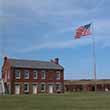HURRICANE SEASON PREPAREDNESS IMPORTANT FOR PROTECTING FLORIDA’S ENVIRONMENT
~Taking simple actions before a storm hits can prevent environmental harm~
TALLAHASSEE – With the Atlantic hurricane season upon us once again, the Florida Department of Environmental Protection encourages Floridians to prepare now before a storm hits. It is essential for residents, businesses and organizations to take the time to make sure household hazardous materials are properly stored or disposed of to reduce the likelihood of pollutants escaping into the environment.
DEP Secretary Herschel T. Vinyard Jr. said, “Sunday officially marked the start of the 2014 hurricane season. While the 2013 Atlantic hurricane season was one of the slowest we've seen, there were three significant weather events that impacted Florida, including Tropical Storm Andrea. From experience, we understand that taking precautions and being prepared is vital to protecting Florida and its residents."
It is important to store hazardous materials properly. Be sure they are not stored in low-lying areas that are subjected to flood zones, and are not left near windows. Placing these materials on secured shelving can limit the possibility of emission into our environment.
“Preparing chemicals and waste, planning for the effects of a storm, and communicating with the state before and after a storm are crucial steps for protecting Florida’s environment when a storm makes landfall,” said Gwen Keenan, director of DEP’s Office of Emergency Response. “While we may not be able to prevent damage, like beach erosion from heavy rain and wind, the spill of hazardous chemicals can largely be stopped before it happens.”
The following materials should be stored in accordance with manufacturer's directions, as well as state or federal regulations.
- Paints, stains and adhesives
- Solvents, fuel, oil and antifreeze
- Batteries
- Pesticides
- Fertilizers
- Expired medication
- Mercury—fluorescent bulbs, thermostats and thermometers
- Propane tanks and aerosol cans
- Household cleaners
Keenan added, “Predictions for the 2014 Atlantic hurricane season indicate the likelihood of a slow season, with NOAA projecting a normal-to-below-normal activity this year. Eight to 13 tropical storms are predicted, with three to six of them expected to become hurricanes. As many as two of them could be major hurricanes.
"Despite that prediction, no one should be complacent. 1992 was projected to be a slow year, but Hurricane Andrew roared ashore proving it only takes one storm to severely impact our state."
The department recommends residents check all property, including storage units and recreational vehicles, to dispose of unwanted hazardous material. Attention to hazardous materials before a storm arrives can help protect your family, property and Florida's environment after the storm passes.
Click here to find a household hazardous waste disposal facility near you and to get additional information about disposing of waste.
Click here for additional hurricane preparedness information from the Division of Emergency Management.
Also, to help Floridians prepare for hurricane season, this year’s Florida Legislature established a tax–free holiday from May 31 to June 8 for you to purchase supplies that will help you during an emergency. Click here for more information








